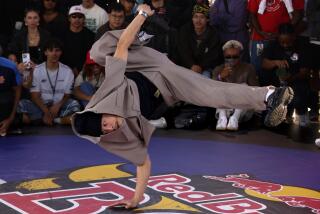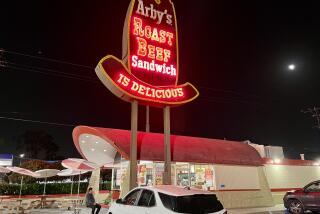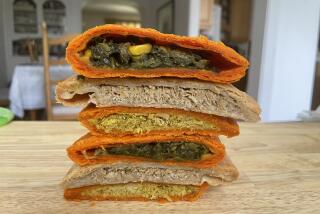Beach Jerky: A Recipe for Success
- Share via
SAN JUAN CAPISTRANO — Transforming a small butcher shop into a snack food company seems like an arduous task, but to Lori and Glen Bradley it was fun.
Bradley’s Meat has been part of downtown San Juan Capistrano’s landscape since 1972. Using an old family recipe, the Bradleys started making beef jerky in 1973, selling it by the pound to the residents of this sleepy South County town that’s known largely as the spring destination of swallows.
The meat shop was a quiet, family-run enterprise tucked away in a little corner of El Adobe Plaza. All that changed four years ago, when Glen Bradley took over the family business and married Lori, who was then a stenography student in a local college.
“I believe that there’s always room for improvement in any product,” she said.
Lori fiddled with the family’s jerky formula in hopes of making the thinly sliced, dehydrated beef a healthier snack food. She lessened the amount of salt and got rid of the preservatives and flavor-enhancing monosodium glutamate. Instead, she used garlic and other spices.
In changing the family recipe, Lori unsuspectingly altered the course of the family business and created a new market--one that caters to health-conscious jerky aficionados.
Linda Whitmore was among the first customers to try the new jerky. Whitmore, a teacher at Newhart Junior High School in Mission Viejo, said her 14-year-old son, who is allergic to preservatives, loves it.
“It’s very popular in his school and kids would offer to pay him to give them pieces of jerky,” she said with a laugh.
In 1988, with the old recipe, the shop sold an average of 10 pounds of jerky a week at $25 a pound. When Lori introduced the new no-preservative recipe the following year, which sells for $28 a pound, customer orders jumped to an average of 75 pounds a week. Sales for 1990 soared even higher during the Gulf War and last year, despite the recession, sales continued to grow.
“Parents, girlfriends and wives were ordering pounds and pounds of jerky for the troops and we couldn’t seem to make enough,” Glen Bradley said.
As demand grew, the size of the butcher shop’s dehydrator expanded. Soon, the large dehydrators were working round the clock. They added a spicier version to accompany the regular jerky. Sensing that they have a hit, the Bradleys worked on selling their jerky outside Orange County.
After settling on a name--Bradley’s Beach Jerky--Lori designed a partially transparent package that shows the sun shining down on a green palm tree on a golden beach, with waves crashing nearby. A surfboard marked “Team Jerky” lies at the foot of the tree and below it, a blond surfer is shown catching a wave. Printed beneath his yellow surfboard is a list of ingredients, a Food and Drug Administration requirement.
The Bradleys located a San Bernardino subcontractor that could make the jerky to specifications. Finding a subcontractor was crucial. Because jerky has a shelf life of about six months, the couple could not keep a large inventory.
A subcontractor not only eliminates the need for a large work force, but also helps limit the company’s losses because it enables the latter to only order jerky based on customer orders.
They also hired a food marketing consultant, who was offered a small share of the company in lieu of a salary.
The Bradleys began marketing their newly packaged jerky in May and they have snagged some major clients in Southern California, including the Navy commissary in San Diego. Bradley’s Beach Jerky is also making inroads in Hawaii, especially among Japanese tourists, who now make up 5% of the private company’s sales. It is also undergoing market tests in several western states, including Wyoming, Arizona and Nevada.
Lori and Glen Bradley are mum about sales of Beach Jerky in the first 10 months, but if the amount of beef they process is any indication, it appears they are doing well. They order an average of 500 pounds of beef to process per week and even more during the holiday season. A one-ounce bag of jerky retails for $1.99, while a seven-ounce bag--a big hit among Hawaiians--sells for $8.95.
More to Read
Eat your way across L.A.
Get our weekly Tasting Notes newsletter for reviews, news and more.
You may occasionally receive promotional content from the Los Angeles Times.








